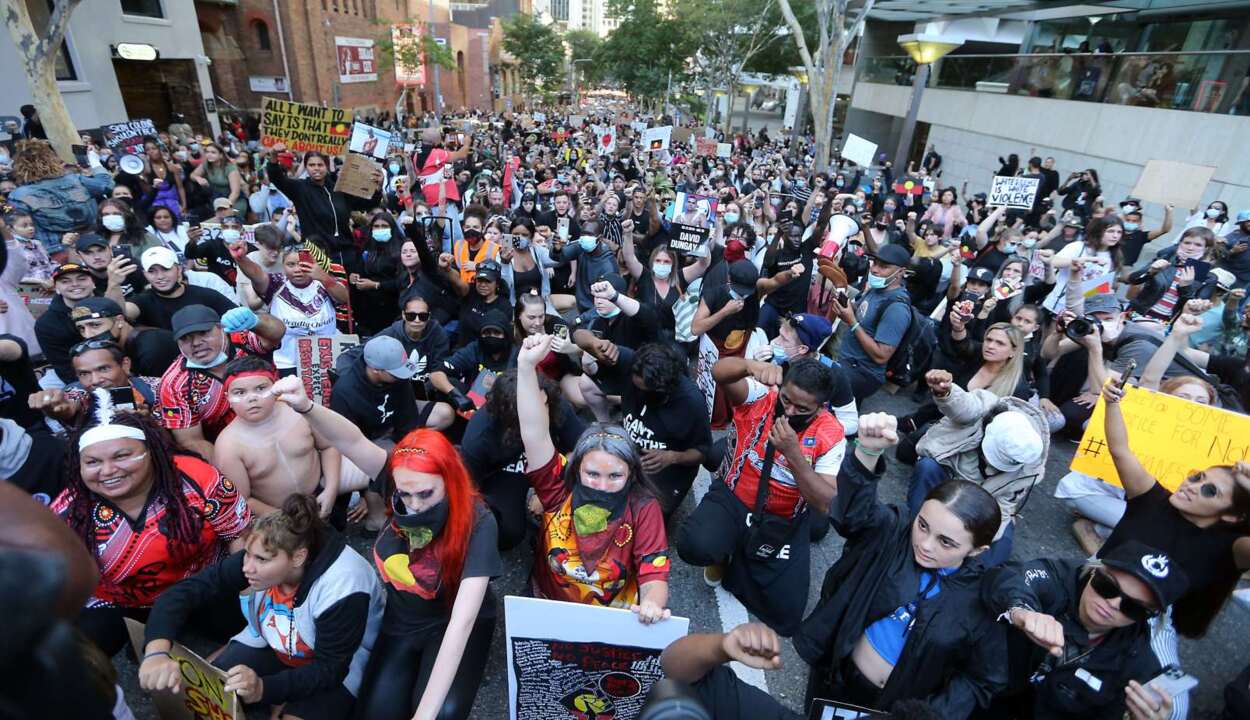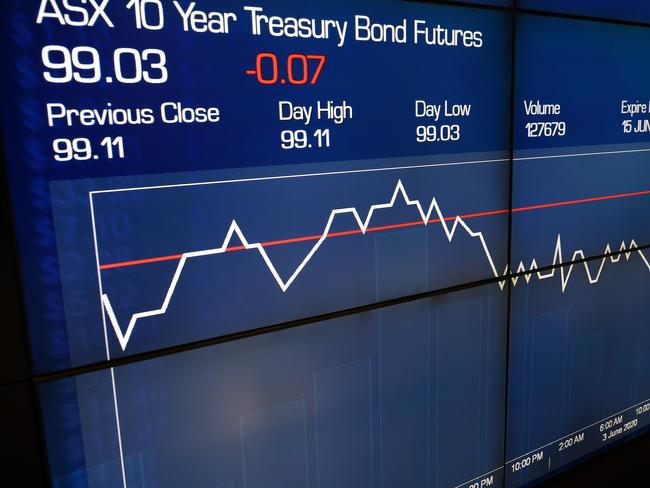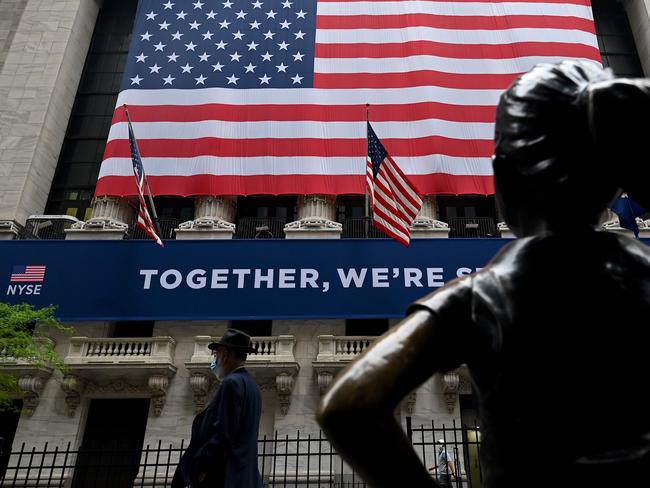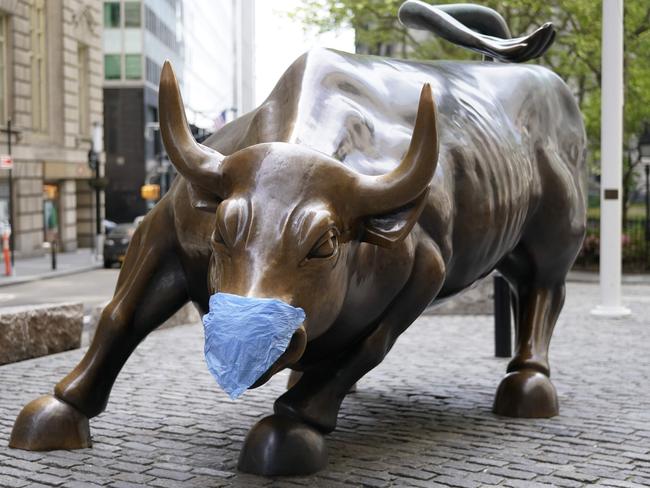Wall Street’s extended rally snuffed out over virus, ASX falls
More than $92 billion was wiped off the Australian share market in a two day “reality check”. It comes after Wall Street had its worst session in three months.

National
Don't miss out on the headlines from National. Followed categories will be added to My News.
More than $92 billion was wiped off the Australian share market in a two day “reality check” as investors recalibrated their expectations of a V-shaped recovery.
But the market has pared some of its losses after being down more than three per cent following an overnight slide on Wall Street on fears of a second wave of coronavirus cases.
The S&P/ASX200 benchmark index closed down 112.8 points, or 1.89 per cent, at 5,847.8 points while the All Ordinaries index dropped 119.6 points, or 1.97 per cent, at 5,959.9.
The Australian dollar was buying 68.61 US cents, down from 69.27 US cents at the close of trade.
Earlier, energy stocks were the worst affected after crude oil prices fell by about 8 per cent overnight.
Oil Search slid 6.3 per cent to $3.27, while Woodside dropped 5.9 per cent to $21.28.
Horizon Oil fell 9.59 per cent to 6.6 cents in a turbulent week for the company. Its shares had gained 10.1 per cent on Tuesday after being cleared of wrongdoing over a payment in Papua New Guinea.
Financials slumped 3.54 per cent, information technology was down 2.97 per cent, and industrials slipped 2.82 per cent.
Westpac had the biggest slump of the big four banks, down 4.43 per cent to $17.68 after the lender said it may face more allegations of wrongdoing in its case over breaching anti-money laundering laws.
Rival ANZ lost 3.54 per cent to $18.78, the Commonwealth Bank shed 2.72 per cent to $66.58 and NAB was lower by 2.94 per cent to $18.51.
Big miners fared a little better. BHP fell 1.88 per cent to $36.07, Rio lost 1.33 per cent to $97.55 and Fortescue fell 1.88 per cent to $14.60. In technology, shares in TPG were higher by 1.74 per cent to $8.19 after internet service provider offered a special dividend of 49 to 52 cents per share should shareholders vote for its proposed merger with Vodafone. Shares in Vodafone parent Hutchison Telecommunications fell 3.23 per cent to 15 cents. In the US overnight, investors continued selling shares after the US Federal Reserve Chairman Jerome Powell warned of a “long road” to recovery and increasing COVID-19 infection numbers also had investors worried. All three major US stock indexes lost well over 5 per cent, posting their worst one-day percentage drops since March 16, when markets were sent into freefall by the abrupt economic lockdowns.

WALL STREET’S WORST DAY IN THREE MONTHS
The reversal follows a rally that had lifted stocks by as much as 45 per cent from its lows in late March, reported to be the steepest surge off a market bottom since 1933.
A downward correction after that kind of run was to be expected, analysts said. A downbeat assessment of the state of the economy from the Federal Reserve seemed to provide the trigger. The central bank forecast that the unemployment rate could stay above 9 per cent this year and would be high for the next several years.

At the news conference that followed that announcement, the Federal Reserve chair, Jerome Powell, warned that the depth of the downturn and pace of the recovery remained “extraordinarily uncertain.”
Meanwhile, Tesla’s stock surged above $A1500 — propelling the Elon Musk-led auto company above Toyota to become the world’s valuable automaker.
It came just weeks after Elon Musk said the stock was over priced.
Shares of the electric car marker, which have been revving all year, spiked more than 8 per cent after it was revealed that Musk is gearing up for mass production of a hotly-anticipated semi truck. In an email to employees Musk announced that it’s “time to go all out” on the company’s first big rig truck.
The stock closed up 8.9 per cent, to $A1500 a share, giving it a market capitalisation of $A280 billion.
Ford, by contrast, is valued at $A40 billion, and General Motors at $A60 billion.
Other economic updates continue to confirm that the economy remains in dire shape. On Thursday, the US government reported that another 1.5 million people filed for state unemployment claims last week.
“The market was very overbought and ripe for a pull back,” wrote Matt Maley, chief market strategist at Miller Tabak, an asset management firm on Thursday. “Powell’s comments yesterday and concerns over a second wave have caused the decline to take place more quickly than we thought.”

Wall Street analysts have long cautioned that a second wave of coronavirus cases that lead to a new round of stay-at-home restrictions or lay-offs could spook investors, who have recently seemed unconcerned that market prices have grown untethered from the bleak economic fundamentals facing consumers and companies.
Coronavirus infections were rising in 21 states on Thursday, as cases in the United States topped two million.
More than 113,000 people have died in the country from the coronavirus.
“This market rebounded so far, so fast — as if all the issues related to the pandemic were behind us,” wrote Doug Rivelli, president of institutional brokerage firm Abel Noser in New York. “So any data to counter that view was bound to hit the markets.”
Cruise ship operators and airlines have been something of a barometer of optimism about a return to normal, rising sharply in recent weeks as travel began to tick higher. On Thursday, Norwegian Cruise Line and Carnival fell about 15 per cent. United Airlines and American Airlines fell about 13 per cent.
The weekly report on unemployment claims comes after the government reported that jobs rebounded last month and that the unemployment rate fell unexpectedly to 13.3 per cent.
Reserve bank chair Mr Powell warned the economic pain could last for years and that there would be “a significant chunk” — millions of workers — “who don’t get to go back to their old job, and there may not be a job in that industry for them for some time.”
President Donald Trump went back to attacking the Federal Reserve Thursday, hitting at the central bank after a steep market decline.
“The Federal Reserve is wrong so often. I see the numbers also, and do MUCH better than they do,” Mr Trump tweeted.
Originally published as Wall Street’s extended rally snuffed out over virus, ASX falls
